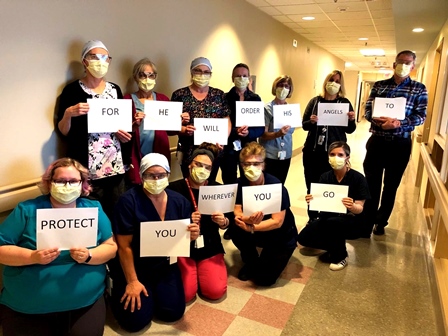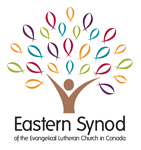
This year will mark my 30th anniversary of being an independent physician and my 15th year as a pastor and theologian. While I have had many and diverse experiences across both vocations, this is my first experience of life, providing health care, and helping people find meaning all in the midst of a pandemic. Like many of you, my experience has been marked by uncertainty, fear, isolation, boredom, anxiety, as well as busy-ness. It has also been marked by gratitude for my wife and daughters, my family, my co-workers, my faith community, and for my country that values a sustainable, affordable, comprehensive, and inclusive public health care system. I would like to share several reflections from this unprecedented time.
Early on in the COVID crisis, a co-worker asked me why we should continue to provide patient care during a pandemic if it meant putting our health, and the health of our loved ones at risk. It was a fearful but honest question. I suppose one potential response to a pandemic would be to try to flee into splendid self-isolation like a modern-day Prince Prospero. Of course, our daughter had just informed us that Inuvik, NWT, where she is already, had one travel-related case of COVID in self-isolation -so really- if you can’t escape COVID by fleeing above the Arctic Circle, where can you go?
The question made me think about my far-flung family of Kuhnerts and Hudsons, scattered across four provinces, a territory and a European nation. There is no way that I could gather all my extended family- aunts, uncles, and parents and gather them safely in a location where we could potentially look after ourselves until after the pandemic had departed. As a family, we were dependent upon front-line care workers showing up to work and taking care of us if and when we got sick, even though we were complete strangers to those workers. I was entrusting the care of my loved ones to people I will likely never ever meet. People whom I would never even be able to thank. And so, how can we not also go to work and provide the best care possible for the people who have been entrusted to our care? I think this belief and knowledge inspires many of my local health care colleagues in the care they provide every day. Who knew that we lived in a time when moral courage meant continuing to do what we had been trained to do and what we have always done?
Early in our local COVID crisis, a medical colleague of mine tested COVID positive. My colleague was young and had mild symptoms so they were not particularly overwhelmed; more distressed were they that they would be unable to provide care and would be burdening their team and the colleagues who would be covering for them. As expected, there was rapid and detailed contact tracing by our infection control department. What was surprising was the number of people who were required to go in self-isolation for periods of 4-14 days. Because I had met with the individual (five days previously) for a 20 minute meeting (held at a socially safe distance), even I was required to self- isolate and do my medical job from home though the exposure was minimal and I remained asymptomatic.
This was a new experience for me. In 30 years of medicine, I have always been a well-trained and integral part of whatever health care system I was working in. Suddenly, my qualifications, my experience, my enthusiasm or even the need of the system entering deeper into crisis did not matter. And this is all good, and right, and proper procedure in a time of pandemic – let me be clear about that point. But it occurred to me that this is also what stigma feels like. By happenstance of birth, I have never experienced significant stigma before in my life. Stigma (one definition perhaps) is the experience of being excluded despite knowing that you have the necessary skills or talent or experience to fully belong because of a quality or characteristic of which the group disapproves. My experience of stigma was brief- barely a week before I was declared right and proper by the system again. But for many in our world- whether based on gender, race, ability, creed, or sexuality their experience of stigma is often life-long. God bless all who daily experience stigma. And God re-create systems that end stigma and marginalization and invite all humanity to fully share the gifts and talents with which we have been blessed.
The self-isolation required to combat COVID-19 has required the suspension of regular worship services now for six weeks. This has included a Holy Week and Easter that we will surely never forget. No doubt, this has created some unique worship opportunities. I have worshipped on-line with Lutherans in Halifax, with the tv people of St. Peter’s, Kitchener, and with a Pentecostal community in Calgary. We have held house-church worship for our own family, on occasion including our daughter in Inuvik via Zoom. We have also, thru Kristina’s inspiration, participated in some on-line programming. These have all been good experiences. But, truth be told, I miss our church. I miss our community. I miss singing and praying and worshipping together- in the flesh. I miss sharing communion. And I miss sharing our lives. And I miss after- church coffee and conversation.
One of the challenges of the past six weeks is coming home each day and trying not to bring the potential of COVID into our home. I, like many of my colleagues, change out of much of my clothing on returning home – hopefully not too much to the amusement of our neighbours! I have limited much of my time at home these last many weeks to my own separate sleeping chamber/office. I have gratefully accepted my family eating meals with me at the doorway of the room as we try to maintain social distancing and still have the semblance of a family meal together. I accept grudgingly (and often only with Karen’s gracious reminders) that I cannot touch things in the house or do things like I might in more normal times. Hardest is the physical distancing that keeps us from any touching – no holding hands or hugging one another or sharing a kiss – it’s the longest period of physical separation our family has experienced. It is wearying and at times, frankly, discouraging. But it is done in love for one another and the care of those who need our health care system. Thank God for family!. And God grant us strength for this on-going journey.
Our Region mandated that Freeport hospital create a COVID ward to help ease the care burden at some of our locally overwhelmed nursing homes, this is one of my work settings for the foreseeable future. These residential facilities, of course, have housed some of the most vulnerable members of our community. Perhaps you have heard that our own Trinity Village, has experienced a significant outbreak and COVID-related deaths?
This ward has created much fear and anxiety amongst staff. It has also necessitated hard work and long hours with new staff in a rapidly changing environment. For me, I am thankful that God is active in the midst of our world, in all its problems and uncertainties. I trust that the resurrected Jesus is in our midst as we work to promote life and healing where possible and to relieve suffering and provide accompaniment when there is no alternative. It appears our COVID crisis will be with us for some time yet.
I am thankful for the people of St. James, for the people of our wider faith community. You are in my daily prayers and I pray that you would also uphold us – our family – but also the work of local hospitals – in your daily prayers also – this too is what we have been trained to do and what we have always done. To God be the glory.
P. Kuhnert
April 29, 2020
